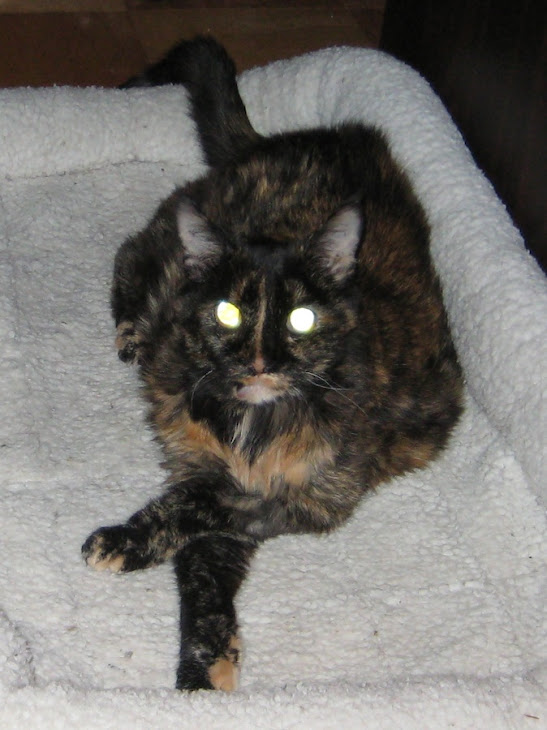Keep Your Cat Safe at Thanksgiving...
...and all through the holiday season! We expect our human companions to overeat on Thanksgiving. The temptation is to feed your cat all kinds of exotic treats. After all, it's a holiday, right? But doing so is asking for trouble!
Thanksgiving Foods Never to Give Kitty
Many of our rich holiday foods are too fatty for cats to digest easily. Gravy is awfully tempting to a cat, but filled with fat and other unhealthy substances. And think about the ingredients of most casseroles: salt, spices, and rich dairy products like butter and cheese that don't do well for a cat's lactose intolerance. That's not a fun litter box to clean...and hopefully kitty would make it to the litter box! Diarrhea can also be a symptom of pancreatitis, a more serious issue than just an upset tummy.
Spices and seasonings such as onions, shallots, leeks, and garlic are not easily metabolized by a cat's liver and can cause a problem known as Heinz body anemia.
Turkey bones can splinter and damage a cat's digestive tract. Yes, cats can eat bird bones, but those are typically much smaller birds and they haven't been cooked.
Desserts are not usually something cats even like; they can't taste sweetness. Raisins and chocolate (especially dark chocolate) are bad for cats. And if someone has sweetened a dessert with xylitol to cater to the weight-conscious, that's highly toxic to a cat. You don't need an expensive vet bill or, worse, a dead kitty, right here at the holidays.
Stuffing (or dressing, as we call it in the south), is not good for cats, as it usually has onions and other spices that can cause Heinz body anemia or an upset tummy.
If you bake your own bread, make sure kitty doesn't get into the raw bread dough while it's rising. The yeast can cause digestive upset, and even convert to alcohol in kitty's system. Cats are crazy enough at the holidays without getting tipsy! Once baked, it's okay if your cat steals a roll, as long as it's not slathered in butter.
Similarly, in raw cake batter; the uncooked eggs in it may have salmonella. Many of those recipes also have butter, which is too fatty and can irritate lactose intolerance.
Thanksgiving Foods It's Okay to Give Cats..with Caveats
One of my cats loves greens and gets all excited every time I get out some lettuce, kale, or arugula. These are okay to give your cats if they like them, as long as they're raw, unseasoned, and without dressing. The same goes for green beans...just not the casserole made from them.
Cranberries are in some cat treats to keep the urinary tract functioning well. Plain, raw cranberries may be fine for your cats to eat (although they'll be far more likely to want to play with them instead). The cranberry sauce is filled with sugar and not as good a choice for a diabetic kitty, but a tiny taste for a cat who's not diabetic won't hurt. Just make sure your crafty feline doesn't chow down on the whole bowlful.
Turkey breast without the bones is fine to give your cats -- but remove the skin, bones, and gristle. Dark meat is too fatty. And make sure it's not heavily seasoned...remember those dangers from the garlic and onions. If you feed your cat a raw diet, kitty may like raw turkey, but always use safe handling procedures for it. Many of the turkeys we buy for Thanksgiving have salmonella if they are not cooked.
The giblets that come with the turkey should also be cooked before feeding to your kitty, for the same salmonella risks as the raw turkey itself. If you don't use the giblets in gravy, boil them in plain, unsalted water for your cats and chop them up, removing any gristle or bones, before feeding them to the kitties.
Plain canned pumpkin is often given to cats on a raw diet as a digestive aid. But not pumpkin pie, and not canned pumpkin pie filling. Again, the spices won't agree with your cat, and kitty won't likely want to eat this, anyway.
MeowPlace has a helpful article with cat-safe alternatives to many Thanksgiving foods that you may find useful.
Be aware that every cat's physiology is a little different, so what one cat can tolerate may cause another to get sick. You know your cats and what they usually eat; feed them some of their favorite food before the guests arrive, and you won't likely have any problems.
Other Holiday Dangers for Cats
When you're preparing the raw turkey, be careful to quickly wash the prep surfaces: cutting board, utensils, and counter top afterward to avoid kitty being tempted to lick up any juices that have dripped there. Salmonella is not pleasant for anyone, and you don't want to have to deal with it in your cat while you have a houseful of guests.
If you have a kitty who likes to explore the trash, empty it frequently keep it in a cabinet or another room with the door closed - a pantry or laundry room near the kitchen. If you're busy cooking and socializing with holiday guests, you may not notice a cat running by with a treasure found in the garbage! Dangerous trash items could include anything that was in contact with the turkey: wrappers, strings, or carcass bones, as well as things like onion or garlic peels, empty cans with some food residue in them, aluminum foil with food on it, or even twisty ties they could ingest.
After dinner, make sure you clear plates from the table promptly and scrape the leftovers into the secured trash. Kitty doesn't need to be tempted by Aunt Jenny's leftover casserole or Cousin Billy's turkey bones while you're in the other room watching football. And you know how fast those cats can be! Watch out for serving plates and bowls on the kitchen counters, as well. Make sure everything is securely covered or that the cats are locked in a separate room before sitting down to eat.
If any of your guests brought you a bouquet of flowers or a plant, make sure everything in it is safe for your cats. In fact, if you're going to be visiting anyone for the holidays and want to give the hostess some flowers, double-check with your florist to make sure your bouquet is safe around whatever type of pets they have. Taking the wrong flowers could quickly take you from A-list guest to Never-invited-again guest! Lilies are a definite no-no, as are any decorations that could be easily pulled out of the arrangement and swallowed or chewed.
Your cat could easily get lost during a holiday gathering. Cats spooked by a lot of strangers can easily dart out a door without your knowledge. Make sure your cats are microchipped and wearing a collar or harness with your contact information on it. And make sure you've updated your information with the microchip company if you've moved.
If you have guests staying with you, they may have medications with them. If grandma drops a pill on the floor and kitty starts playing with it or eats it, that could be toxic. Even acetaminophen (Tylenol) is highly toxic to your cats if they get a hold of it. Keep your cats out of the guest bedroom and bathroom during your company's stay.
If your cats get stressed during the holidays when the house is abuzz with guests, you may want to try some calming remedies for them. Those may help them not only chill out, but some may even have them snoozing through the whole affair.
How Can I Tell if My Cat Has Been Poisoned?
Cats are masters at hiding their symptoms if they don't feel well, so you may not notice anything right away. But if your cat is hacking up something that looks unusual (as opposed to the usual cat vomit you see all the time), find out where kitty got it and save it to show the vet so you can seek proper treatment. Stinky diarrhea may also be a symptom that your cat has gotten into some dairy products or overly fatty foods and may be having a touch of pancreatitis.
After your guests have left, if your cat seems listless or won't eat, a vet trip could be warranted. Cats don't go on a diet intentionally. And cats can't go without food for an extended period of time, or they'll develop a condition known as fatty liver that can be serious or fatal. Not eating is a definite symptom that something's wrong.
If you'll have a houseful of guests for the holiday, make sure they understand not to offer your cats any treats that aren't sanctioned by you. If you have to make signs for this, do so. Some people think it's cute to offer some of their party food to someone's pet, and children may not know any better. If people insist on feeding your cats, make sure there are acceptable treats available for this. Or you could isolate your cats in a bedroom away from the crowd. Better safe than sorry when it comes to the safety of your feline companions!
Sources: "Thanksgiving Pet Safety" on American Veterinary Medical Association (AVMA) site; Dr. Eric Barchas, "Ask a Vet: Which Thanksgiving Foods Are Safe for Cats?" in Catster, updated November 15, 2018; Kelli Bender, "Which Thanksgiving Foods are Dangerous for your Pet?" in People, November 14, 2018; "Thanksgiving Safety Tips" on the American Society for the Prevention of Cruelty to Animals (ASPCA) site; Pam Johnson-Bennett, "12 Thanksgiving Safety Tips for Cats" on her own site; "Thanksgiving Safety Tips for Cats" on Petwave; Stephanie St. Martin, "Thanksgiving Pet Safety: Can Our Pets Eat Our Favorite Thanksgiving Foods?" on Care.com.











